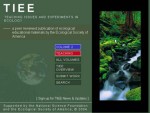Here is a suggestion for meeting criterion 2 in your next grant proposal. TIEE (Teaching Issues and Experiments in Ecology), an NSF supported and ESA sponsored website and CD, has a section called “Data Sets” that is perfect for LTER data. As co-editor of TIEE I will work with you to get selected Data Sets into the TIEE format and with the education sections.
TIEE allows undergraduate and graduate students to work with data in Excel files and learn an ecological concept or idea especially well illustrated at the LTER site. TIEE’s foundation is that students who actively engage with data in lecture and lab learn ecological concepts better—and about the process of science. Hundreds of studies based on theories of learning and cognition support this kind of “student active” learning (D’Avanzo 2003 a,b).
To see what I am talking about, go to the Cedar Creek TIEE Data Set called “Effects of Plant Biodiversity on Ecosystem Productivity within a Savannah Grassland Community” by Joe Fargione and David Tilman (http://TIEE.ecoed.net/vol/v2/toc.html).
The authors include several data sets here:
- Mean plant biomass and standard errors for species richness treatments over seven years (students explore the relationship between species richness and plant productivity)
- Percentage of plots that exceeded the maximum monoculture biomass, allowing a test of the sampling effect hypothesis
- “Bonus” data from 168 plots, including the presence/absence of functional groups
In addition to the Data Sets themselves there are sections called “Overview” (about the research), “Student Instructions” (explains the data), and “Faculty Notes” (suggests ways to use the Data Set in ecology classes.
Actually you don’t have to wait until your next proposal to submit a TIEE Data Set. I am working with several LTER sites – including Konza, Harvard Forest, and Santa Barbara – for the next volume of TIEE (published January 2005).
A final note for grad students and post-docs interested in teaching as well as research: TIEE is a peer reviewed ESA publication and will be useful on your vita. In addition, some colleges want you to describe your teaching “philosophy”; you will learn a lot about modern teaching approaches and theory by working on a TIEE Data Set.
If you are interested in meeting criterion 2 via TIEE or in submitting a Data Set, please contact me (cdavanzo@hampshire.edu). You can also go to the website (www.tiee.ecoed.net) and select “submit work” on the homepage. Your effort will be worthwhile – TIEE receives thousands of hits weekly and is quickly becoming well known and valued by college and university faculty.

 Enlarge this image
Enlarge this image